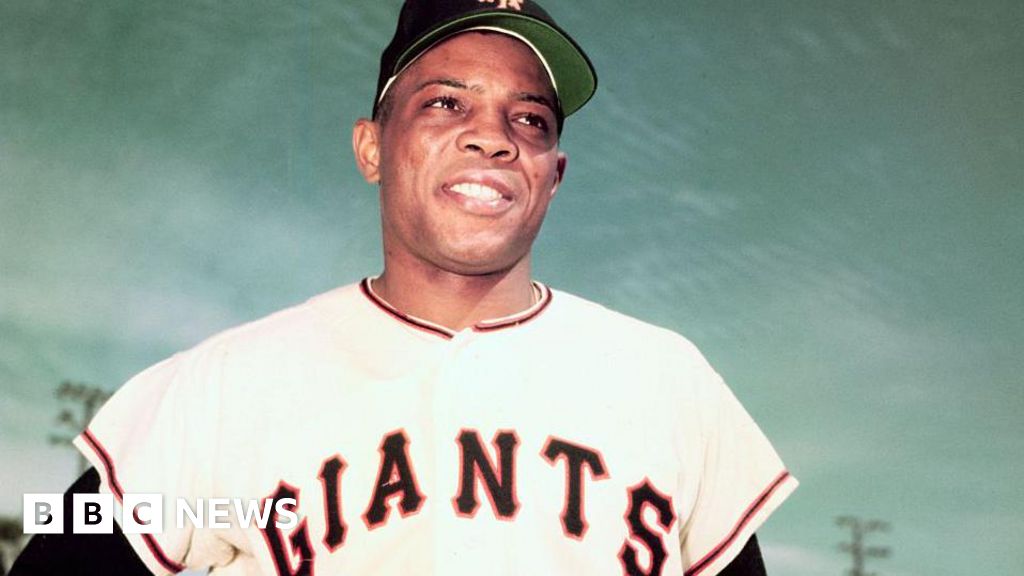Image source, Getty Images
- Author, Max Matza and Samantha Granville
- Role, BBC News
-
The baseball world has saluted the achievements of Willie Mays, widely considered one of the sport’s best ever players, after his death at age 93.
Mays was twice declared the league’s Most Valuable Player (MVP) and won the World Series with the New York Giants in 1954.
His famous catch during the championship remains one of the most iconic plays ever seen in America’s so-called “national pastime”.
In addition to his on-field achievements, Mays embodied an attitude of “just keep playing and having fun”, one former player told the BBC.
Nicknamed the “Say Hey Kid”, the centre fielder had been baseball’s oldest living Hall of Famer.
His death was announced “with great sadness” on Tuesday by his former team, who are now the San Francisco Giants.
Mays’s son, Michael, told the Associated Press that his father died in the presence of his family and wished to thank his fans for their years of support.
“My father has passed away peacefully and among loved ones. I want to thank you all from the bottom of my broken heart for the unwavering love you have shown him over the years,” he said. “You have been his life’s blood.”
Major League Baseball (MLB) said it was “heartbroken” over the death of “one of the most exciting all-around players in the history of our sport”.
Mays was a “true Giant on and off the field,” MLB commissioner Rob Manfred said.
“His incredible achievements and statistics do not begin to describe the awe that came with watching Willie Mays dominate the game in every way imaginable,” Manfred added.
But Mays was “more than just a baseball icon”, California Governor Gavin Newsom said. “He broke barriers and inspired millions of Americans – setting records, bringing joy to countless fans, and becoming a role model for a generation of future athletes.”
Despite having not played professional sports for over 50 years, the MLB added 10 more hits to Mays’s career record earlier this month, after deciding to incorporate statistics from the Negro League.
His record now stands at 3,293 hits, including the 10 he hit for the Birmingham Black Barons in 1948.
As recently as Monday, Mays said he would not be able to attend a game in his honour that was scheduled for Thursday in Birmingham.
“My heart will be with all of you who are honouring the Negro League ballplayers, who should always be remembered, including all my teammates on the Black Barons,” he said. “It’ll be a special day, and I hope the kids will enjoy it and be inspired by it.”
Mays was born and raised in Westfield, Alabama, and began his professional baseball career while still in high school in 1948.
In 1950, he joined the New York Giants – who later became the San Francisco Giants – and in 1951 hit 20 home runs for the team as a 20-year-old.
After the 1951 season Mays was drafted into the US Army to serve in the Korean War.
The famous catch
Image source, Getty Images
After missing the 1952 and 1953 seasons due to his military service, Mays returned in 1954 to earn his first MVP award.
That same year, he helped the team defeat Cleveland in the World Series.
The famous over-the-shoulder catch he made during the game helped the team clinch the win with a score of 5-2 after 10 innings.
In 1972 he was traded to the New York Mets at the age of 41, where he played for two more seasons before retiring.
After his playing career, he was still a regular face in the Giants dugout, offering advice on and off the field to young players.
“He always had time for you. He had a way about him that you could talk to him about baseball and he would give you honest opinions,” retired Giants player JT Snow told the BBC.
“Baseball is a hard game, and we go through ups and downs. I remember him saying: ‘Just keep playing and having fun.’”
Snow said Mays kept the noise of analytics and statistics out of his head, sticking with a simple philosophy that saw him change the game: “I see the ball and hit the ball, and I run the bases and I catch it.”

